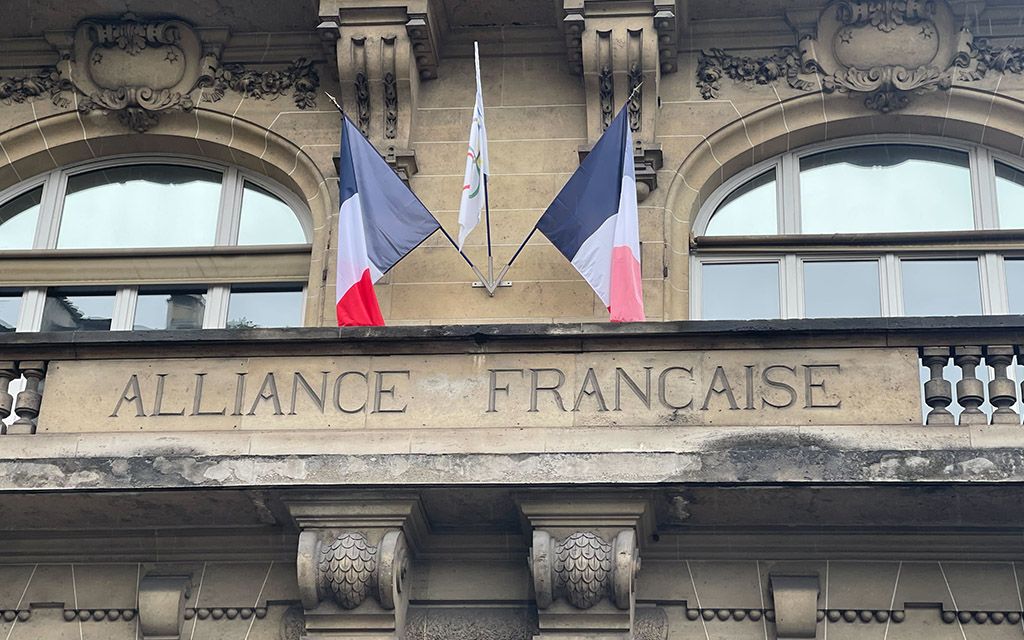
The Alliance Francaise of Paris, which also has a branch in Phoenix, is an epicenter of cultural exchange where international visitors can learn about French culture and language. (Photo by Doyal D’angelo/Special for Cronkite News)
PARIS – As much as providing cultural workshops helps to encourage positive exchange and understanding between French and U.S. citizens, breaking the language barrier can be a challenge for both the teacher and the student.
It makes for a 360-degree learning experience for everyone involved. Enter the Alliance Francaise of Greater Phoenix, whose goal is to encourage the study of French language and to promote the appreciation of the country’s culture.
With the Paris Olympics underway, interest in French culture is greater than ever. Americans have long been fascinated by the country’s history, fashion and food. The late French general and politician Charles de Gaulle once said, “How can anyone govern a nation that has 246 different kinds of cheese?”
The Alliance Francaise hopes to provide a greater understanding of the country through language instruction.
Ebenezer Zeya, French teacher at the Alliance Francaise of Greater Phoenix, feels like teaching French actually provides more opportunities for him to expand his understanding of English.
“It’s a very big challenge,” Zeya said. “Because all my friends and the people I meet here have some English, I have to improve my English, I have no choice.”
Zeya started teaching French at the Alliance in 2021, and despite not feeling completely comfortable speaking English, he has taught French to Americans in many different language centers in Arizona.
Engulfing oneself in a new culture can be a lifelong journey, yet a necessary one for those like Zeya who are seeking more resources for themselves and their families. Working at the alliance has helped Zeya get the funding he needs to be able to provide for his family in Cote d’ivoire, who he only sees once every few years.
“In Africa there is a lot of poverty,” Zeya said. “It can get very tough, so I go back and provide for my family when I can.”
Being far away from his family for long periods of time is tough for Zeya, but he is grateful for the opportunity to teach, which he says is his passion.
International nonprofit organizations like the Alliance Francaise and cultural exchange organizations can be a great tool for those seeking job opportunities abroad. It potentially allows for a better life than what may be afforded otherwise.
For others, learning a new language and assimilating a new culture brings many more opportunities in aspects of business.
Yet cultural exchange goes beyond spoken language.
In the lead up to the Paris Olympics, Alliance Francaise leaders have been working on ways to incorporate sports into their teaching. The realization that sport is very important in American society came quickly, which can make it a useful tool to reach more students and to keep them engaged thereafter.
Isabelle Leroux, president of the Federation of Alliances Francaises USA, says that sport is a relative novelty for the organization as an emphasis on philosophy, history, culinary arts and language has always dominated
“It was not something we used to promote, but suddenly with the Olympics everything changed,” Leroux said.
This means an expansion of their audience, particularly to young people.
“We realized that sports have fantastic value,” Leroux said. “It is something that we should carry and share with our audience”.
The alliance has since held more events and workshops that focus on sports and its impact on society. Recent and upcoming events touch upon the history, philosophy and significance of the Olympic Games, as the event has strong roots in Paris.
The alliance has even brought in Olympic athletes and other high-level athletes to speak with the network of students across the country.
The reach of the organization materializes on every continent and includes over 800 chapters across the globe. The alliance considers itself an ambassador and a contributor to soft power for France.
“We are a network. We help each other. We materialize all of our resources,” Leroux said. “Every chapter is a little piece of France.”
Much of this exposure comes through the vast array of partnerships every chapter makes with its local universities and businesses, as well as national and international organizations.
The Phoenix location has partnerships with Arizona State, the Musical Instrument Museum, Scottsdale Center for the Performing Arts and Greenheart Exchange among others. These connections allow for collaborations on events and workshops for students.
“We do many things inside and outside of the alliance just to let people know about the chapter,” Bobin said.
Packing a full house for events recently has been a sign of success, she said, but the chapter needs to keep gathering students since its funding is largely dependent on signing students up for classes and long-term membership.
“There are not a lot of francophone people here in Phoenix,” Bobin said. “When I came to Phoenix, the alliance was basically not on the map.”
Growing the Phoenix location from the ground up required the help of the federation and sponsorship.
Because smaller chapters like Phoenix may not have the same funding and sponsorship as locations in bigger cities such as Los Angeles, Miami and Seattle, the federation and the overarching organization is looking for ways to modernize its approach while maintaining the integrity and quality of its curriculum through the spread of online courses and even the use of artificial intelligence tools like Otter and Alias.
The use of AI is becoming present in delivering exercises and vocabulary assistance to students, which helps to save money and time.
“We really try to promote these tools,” Leroux said. “They can help you and then you can have more time to take care of your students.”
For the Alliance Francaise, meeting students where they are, paying close attention and adapting to the needs of each individual student is a major focus.